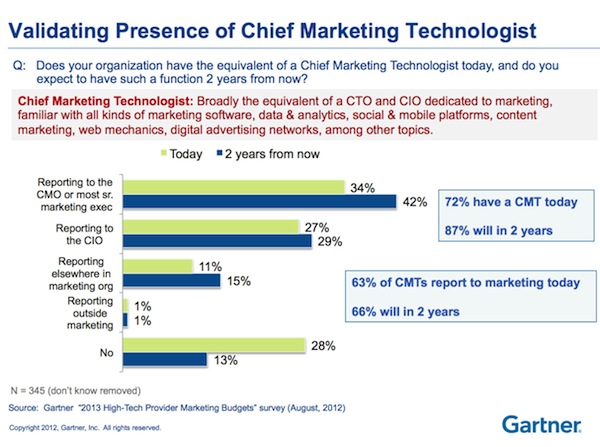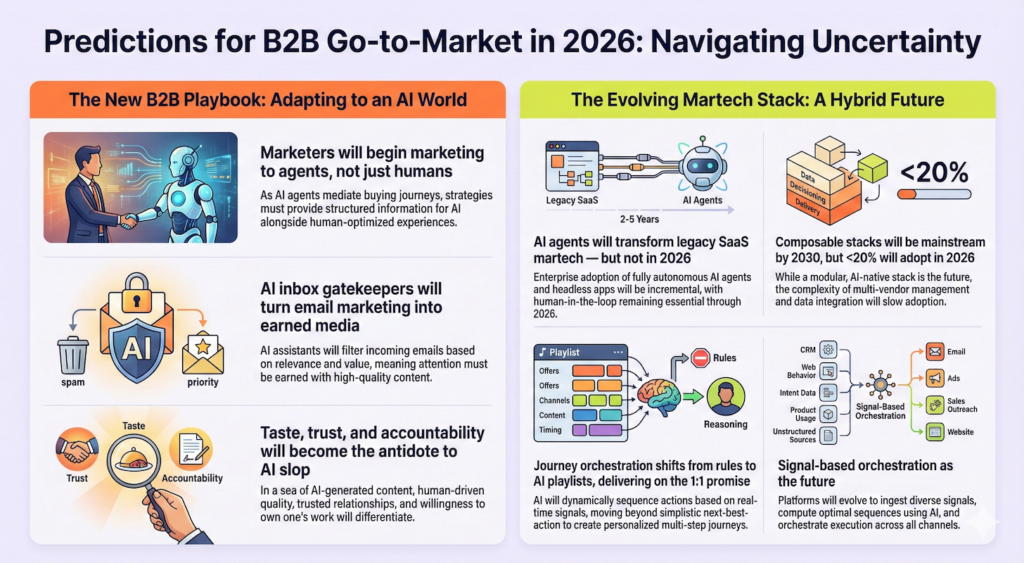Laura McLellan, a research VP at Gartner, caused quite a stir at the beginning of this year when she boldly predicted that by 2017, CMOs will spend more on IT than CIOs.
Exclaims of, “Really?!?!,” echoed among marketing and IT professionals alike for months thereafter. But the evidence was compelling, and those of us working in the marketing technology space have been witnessing this trend first-hand.
Now, Laura is back with even more research to support that prediction, which she’ll deliver in a webinar on October 2, Profile of Marketing as a Major Technology Buyer. It’s open for anyone to attend and will cover the results of three recent research projects conducted with marketing executives across multiple industries.
Exclusive Breaking News
However, Gartner was willing to share one exciting finding in advance to readers of this blog. Their 2013 High-Tech Provider Marketing Budgets survey included this question: Does your organization have the equivalent of a Chief Marketing Technologist today, and do you expect to have such a function 2 years from now?
Brace yourself for something amazing:
72% answered that they have that role today, and 87% expect to have it within two years.
I danced a jig on the spot.
Okay, there are a few caveats. First, the role of a chief marketing technologist — which was defined as “broadly the equivalent of a CTO and CIO dedicated to marketing, familiar with all kinds of marketing software, data & analytics, social & mobile platforms, content marketing, web mechanics, digital advertising networks, among other topics” — is open to interpretation. Titles and responsibilities no doubt vary tremendously.
Second, not all of the people serving in these roles report directly to the CMO or the most senior marketing executive — although that is the largest cluster of respondents. Overall, 63% of these chief marketing technologists report to marketing today, and within 2 years 66% will. The rest report to the CIO, with a tiny sliver reporting to some other entity outside marketing.
Third, the population of “high-tech providers” who participated in this survey is probably not representative of businesses overall. Being in high-tech, it’s reasonable to assume that they are more likely to be in the vanguard of the technologification of marketing. But while they may be ahead of the curve, the shift to digital marketing — and, more broadly, digital business — is impacting pretty much every organization on the planet. I expect others will follow this lead soon enough.
Finally, the summary data that Gartner was willing to share in the slide at the top of this post did not include respondents who answered, “I don’t know” to this question, which I believe was approximately 10% of those surveyed. That could lower those percentages by a tad, but it doesn’t change the gist of this finding.
Adjusting budgets and implementing new organizational structure are how you enact major changes in a company. What this Gartner research reveals is that companies are doing just that in the pursuit of an effective marketing technology strategy. They recognize that it’s crucial to the future of their business. And the largest number of them are putting a “chief marketing technologist” in place, reporting directly to the CMO, to champion this effort.
I look back on my posts over the years on the rise of the marketing technologist, advocating marketing technology leadership at Pivot, and agencies and the marketing technologist revolution — the book of marketing technology on Broadway if you prefer a video version — and can’t help but smile to see those concepts coming to life.
Thank you Gartner. Thank you Laura. Now excuse me while I go back to that jig…



